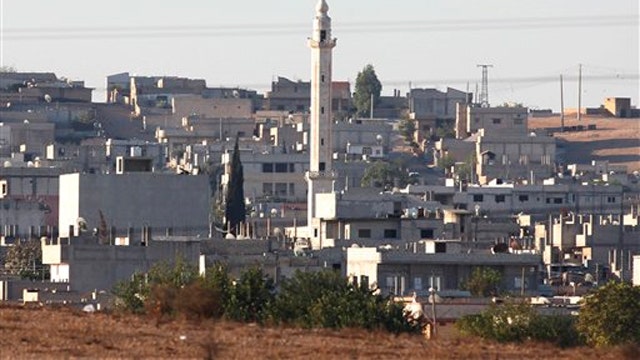Kobani fight signals ISIS may target Turkey next
Frank Wuco on the strategy needed to stop the terrorists
Kobani is a small town in northern Syria on the Syrian-Turkish Border. Most of its inhabitants are Kurdish, but recently, the town has swelled up with refugees from other parts of Syria, Christian and Muslim, alike. It was the last major hold-out against ISIS’s complete control of a corridor north-east of Syria.
The town is sandwiched from the east and west by two ISIS strong holds.
What is taking place in Kobani, is no less than a televised massacre in the making, with no decisive efforts by Western, Turkish, or Arab governments to stop it from happening. For the past three weeks, Syrian-Kurdish fighters who have been holding out against the IS have been calling for international military help, which only came in the form of US-coalition airstrikes. [pullquote]
What we can conclude (from action not words) is that there is no appetite to hold ISIS back in this Syrian-Kurdish region. For the airstrikes, as they are being conducted right now in Syria, have been largely ineffective.
However, over the past three weeks, little has been done to change military tactics or the volume of airstrikes there. We must remember that the dichotomous choice presented by American politicians and talking heads of “airstrikes” vs. “boots or the ground” are false dichotomies.
Airstrikes can be modified, both in volume and method, to effect greater impact on the ground. We have seen this take place around the Mosul damn and Tikrit’s oil fields, in northern Iraq, leading to the withdrawal of IS forces from these areas.
What we also know is that the advance on Kobani, a stone’s throw away from the border with Turkey, happened immediately after the release of Turkish hostages in Mosul. The Turkish government has maintained that it did not pay any ransom money, yet it has refused to give further details as to the deal struck with IS to release the hostages.
We also know that the Turkish government has not engaged the ISIS fighters stationed along their borders. Despite the pleads of Turkish-Kurds, and an apparent (though late) shift by the Turkish parliament to authorize military action against ISIS, what we see on the ground is that, in fact, a pull back of the Turkish troops to avoid any confrontation with ISIS has taken place.
What has also become very clear is that ISIS has new, high tech weapons, which are no match to local Kurdish fighters’ weapons. Those weapons have been purchased through money from some of the Gulf States, but are for the most part American-made weapons. The popular refrain is that these weapons were acquired by ISIS from the defeated Iraqi Army in Mosul. However, we must not forget that they must have had a good amount of these weapons to defeat the well-equipped Iraqi Army in the first place. In addition, reports about IS well equipped army have been floating around for months before the fall of Mosul.
We should not however concentrate our blame on the Gulf States alone. Qatar and Saudi Arabia, the source of most of the “private” funds to IS, are allies of the United States and both countries house large American military installations.
The increased support of, what were at the time called opposition groups in Syria, happened on the heal of Saudi Arabian rejection of a long-coveted seat on the Security council, and after President Obama backed away from direct military intervention, despite the crossing of the so called “red line” with the Syrian government’s use of chemical weapons.
One has to start wondering about the connection between these events, and to consider that war by proxy has been taking place for the past two years. What we have witnessed in the past few weeks in Iraq, were some of the unintended consequences of this policy. Yet, what ISIS advance helped achieve is the ouster of an Iran-backed Iraqi prime minister, and further acknowledgement of an independent Iraqi-Kurdish region in the oil-rich north. This Kurdish government, not to be confused with Turkish Kurdish opposition or Syrian Kurdish fighters who have allied themselves with Turkish opposition, are firm US and Turkish allies.
What we have also learned from Kobani, is that the US, Turkey, and others are still gambling on the “enemy of my enemy is my friend” policy. The war by proxy, which I mentioned above, is still raging in Syria and Iraq. In some cases, decisive military intervention was necessary to manage some of the unintended consequences in Iraq. In other cases, there has been very little appetite to fight the same enemy (ISIS), due to their strategic usefulness in these areas. For Turkey, which shares a very long border with the increasingly ISIS-controlled Syrian border, engaging militarily with IS has the potential of opening up a huge can of worms that the Turkish government may not be able to contain. Additionally, ISIS is currently engaged with pro-PKK Kurds in Syria, traditional enemies of the Turkish state. For some of the Gulf States and the US, having ISIS in Syria maintains the balance of the war by proxy with Iran- and Russia-backed Syrian regime.
Ultimately, what Kobani tells us, is that strategic gains for the “coalition” governments trumps out the importance of protecting human lives, even when as many as 50,000 (Kurdish and Arab) lives hang in the balance.









































